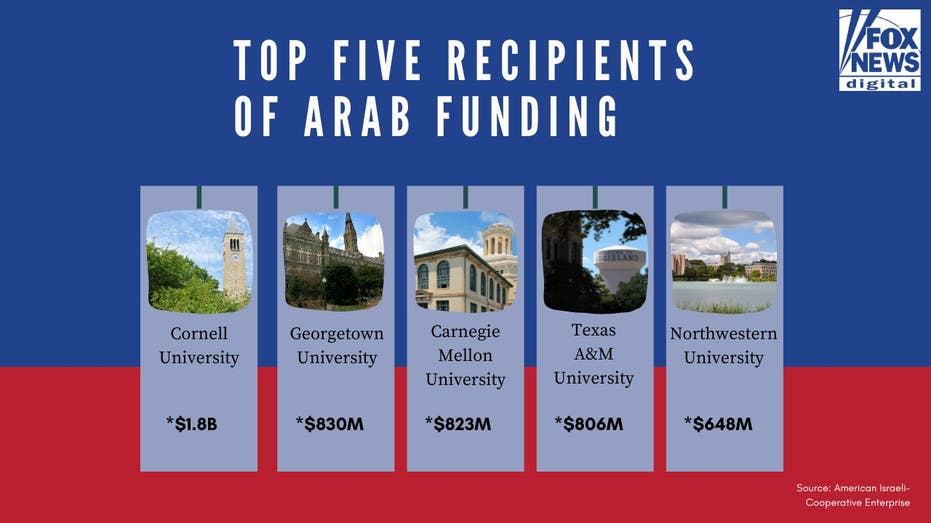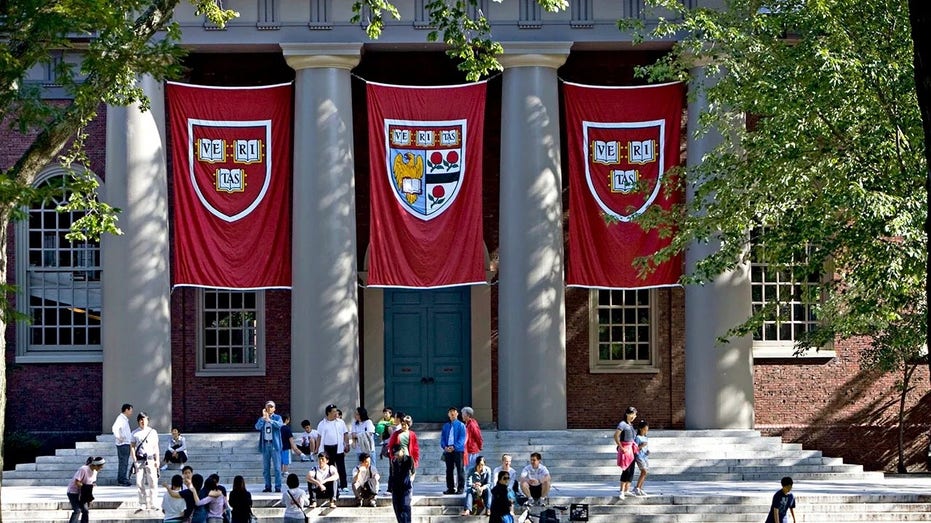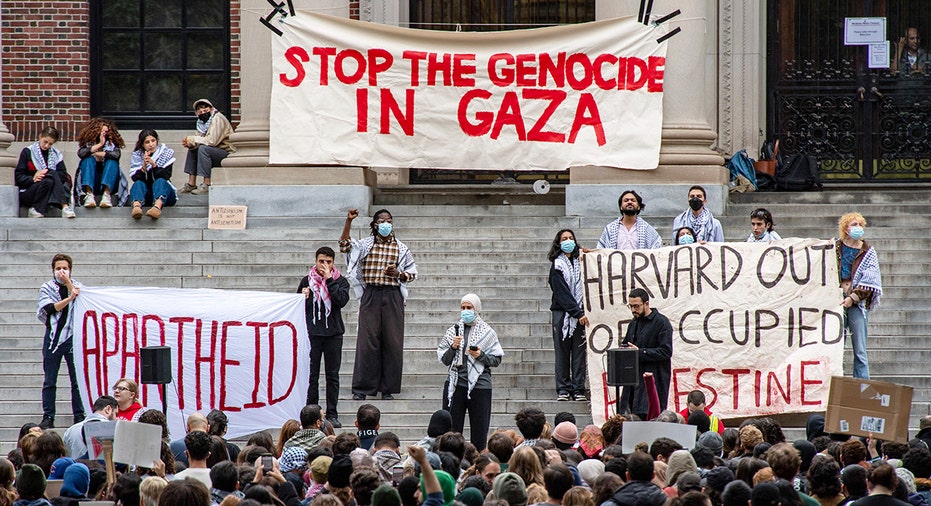Funding from Arab countries to US universities raises questions: 'Almost always come with strings attached'
Qatar has been the largest investor in universities in recent years
Colleges criticized for Arab donor dollars
FOX Business' Lydia Hu has the latest on controversy following Hamas' attack on Israel on 'America Reports.'
A 2023 report from the American Israeli Cooperative Enterprise (AICE) is shining a light on foreign donations to American universities and the role they could be playing in influencing college campuses and responses to geopolitical events.
The May report, conducted by Mitchell Bard, a foreign policy expert and the executive director of the AICE, found the top donors to American universities are Arab countries like Qatar, Saudi Arabia, the UAE, Kuwait and Egypt.
Qatar was the largest source of funding, donating roughly $5 billion and was followed by Saudi Arabia donating roughly $3 billion.

Qatari riyal banknotes (left) and mixed denomination Saudi Arabian riyal banknotes (right). ((Getty Images))
"Foreign government contributions to universities almost always come with strings attached or, at the very least, ulterior motives," said Ben Freeman, the director of the Democratizing Foreign Policy program at the Quincy Institute.
"This can include image management, wherein dictators want to be associated with America's intellectual elite and literally be seen with them in photo-ops that can then be shared with their domestic audiences to prop up these regimes at home," he said. "Another goal is reputation laundering, where dictators want to shift the debate about their regimes away from the bad things they've done – like murdering journalists with bone-saws and other human rights abuses – and towards more positive improvements like giving women the right to drive."
The top five university recipients of Arab donations were Cornell, Georgetown, Carnegie Mellon, Texas A&M and Northwestern, according to the report from AICE.

The top five university recipients of Arab funding, according to a May 2023 report. ((Graphic by Ashley Carnahan))
Freeman told FOX News Digital, that in some cases, there is "outright censorship" that comes with the money.
"We've heard glaring examples of this with Chinese funding of American universities, but there's also evidence that the UAE and Qatar are doing it at universities with branch campuses on their soil. More generally, this funding is a long-term investment in American influence. Even if none of the more nefarious aspects of foreign funding of American universities are taking place, foreign governments are counting on their donations leading to a general sense of goodwill towards their countries," he explained.
Freeman added: "This could translate to an implicit bias amongst university graduates, which is probably why it's no coincidence that most of the top recipients of funding from countries in the Middle East are universities that produce some of the top foreign policy minds in the U.S."
University response to the Israel-Hamas war
Bard’s report has brought up the question of whether foreign donations from these countries impacted universities’ responses to the outbreak of the Israel-Hamas war.
Student groups at Harvard University released a letter after the Oct. 7 terrorist attacks, saying Israel was "entirely responsible" for Hamas’ violence that killed roughly 1,200 people, most of whom were civilians.

Harvard banners hang outside Memorial Church on the Harvard University campus in Cambridge, Massachusetts, on Friday, Sept. 4, 2009. (Getty Images)
Harvard University President Claudine Gay and members of Harvard’s leadership released an initial statement on Oct. 9 saying they were "heartbroken by the death and destruction unleashed by the attack by Hamas that targeted citizens in Israel."
The university came under fire for not explicitly condemning Hamas’ attacks and addressing the letter from the student groups. In a second statement released on Oct. 10, Gay said there should be "no doubt that I condemn the terrorist atrocities perpetrated by Hamas. Such inhumanity is abhorrent, whatever one’s individual views of the origins of longstanding conflicts in the region."
She added students have the right to speak for themselves but no student group "speaks for Harvard University or its leadership."
Cornell University professor Russell Rickford said the attacks were "exhilarating" and "energizing" before apologizing for the "horrible choice of words." "I recognize that some of the language I used was reprehensible and did not reflect my values," he said in a statement published by the Cornell Daily Sun.
And on campuses nationwide, pro-Palestinian protests have broken out with some chanting "From the river to the sea, Palestine will be free," a phrase that is perceived as calling for the eradication of Israel.
Students at the University of Central Florida hold a rally and march in support of Palestinians in Orlando, Florida, United States on October 13, 2023.
Students at George Washington University projected a sign on the school’s library that said "Glory to Our Martyrs" and New York University students were caught on camera tearing down posters of hostages taken by Hamas.
Rep. Mike Gallagher, R-Wis., told "America Reports" it wouldn’t shock him that foreign regimes are using their monetary donations to "corrupt colleges and influence students."
"Some of our most elite institutions have become cesspools of antisemitism," he said.
CLICK HERE TO GET THE FOX NEWS APP
Freeman also added that it wouldn’t be surprising to learn university responses to the Israel-Hamas war were correlated with countries they've received substantial funding from.
"At the end of the day, there's a survival of the funded kind of process going on here. A university that openly speaks out against a country that funds it puts that funding at risk. And, another university might be all too eager to accept that funding and stay silent about the country's transgressions," he said. "That's going to be true of any major foreign policy issue, whether it's the Israel-Hamas war, the Russia-Ukraine war, or U.S. relations with China."























